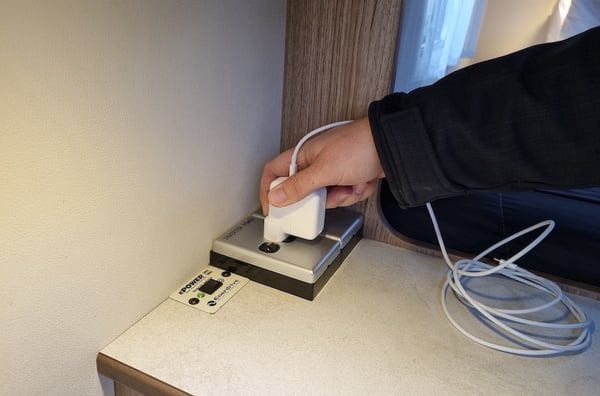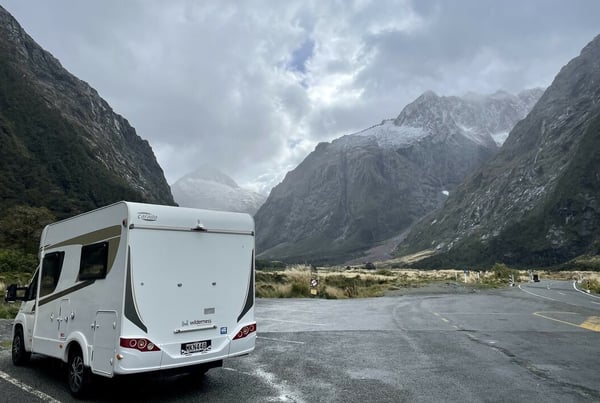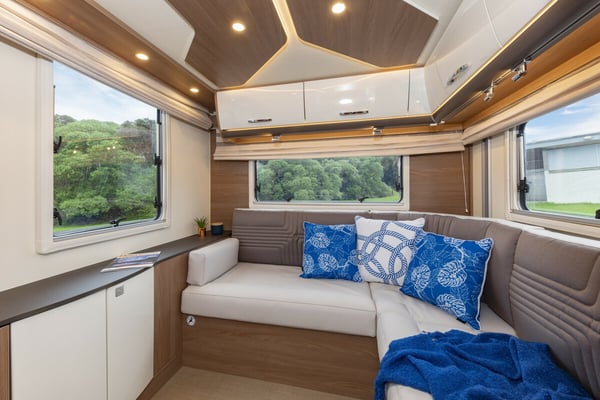Technical Guides
- Buyers' Guide (44)
- Bürstner Motorhomes (7)
- Carado Motorhomes (3)
- Choosing a Motorhome (28)
- Choosing a Motorhome Dealer (5)
- Maintaining Motorhomes (6)
- Motorhome Industry (53)
- Motorhome Reviews (38)
- Motorhome Tips (24)
- Motorhome Travel (7)
- Motorhomes Costs (6)
- Owners' Stories (24)
- Technical Guides (29)
- Wilderness Motorhomes (36)
- Resources
- Blog

Natural renewable energy sources like wind, water flow, geothermal steam and tidal surges can all be harnessed and extracted efficiently — with the right technology.
However, the sun is the most suitable renewable for keeping the habitation battery in your motorhome charged because the infrastructure is affordable enough. Even fitting the most basic solar panel system to your motorhome will help lower your overall cost of ownership — so you can freedom camp for longer and reduce your overall camping spend.
In this blog, we examine how solar systems work, the types of solar panels available and the many benefits of owning a motorhome with a solar system. We also discuss the affordability of solar panels, the risks of installation and whether solar power is right for you.
Natural renewable energy sources like wind, water flow, geothermal steam …
As the point of contact between the road surface and your motorhome driving along it, tyres are the very foundation of vehicle safety. Although highly durable, they’ll need replacing at regular intervals during the lifetime of your RV.
But which tyres should you choose for your motorhome when the original factory ones wear out?
In this blog, we discuss when to replace your motorhome tyres and what to consider when choosing new ones. We also highlight some essential tips about tyre codes, load indices, tyre load capacity and speed ratings — to help you select the appropriate tyres for your motorhome.
As the point of contact between the road surface and your motorhome …
Motorhome water damage can lead to costly repairs, disrupt your travel plans and decrease the value of your investment. It’s perhaps the most preventable wear and tear on a recreational vehicle. All it takes is scheduling regular checks and maintenance.

The more you understand your motorhome tyres and how to maintain them, the safer your RV adventures will be — and the longer your tyres will last.
As a motorhome owner, it’s important to routinely check the air pressure in your vehicle’s tyres for safety, fuel efficiency and prolonging their lifespan.
In this blog, we discuss how motorhome tyres differ from car tyres, why having the correct tyre pressure is important and how to calculate the right tyre pressure. We also cover inflating your motorhome tyres and fitting a tyre pressure monitoring system.
The more you understand your motorhome tyres and how to maintain them, the …

If you suffer from sleep apnea, you’ll know how important it is to use a continuous positive airway pressure (CPAP) machine every night. But what about when you’re away from home — on the road or in the backcountry on motorhome adventures?
In this blog, we explain how a CPAP machine can help you sleep in your motorhome when you’re hooked up to mains power and while you’re off the grid. We look at what you need to run a CPAP machine and how much power it may use.
We also review some commonly held beliefs about the extra equipment you need, like an inverter, solar panel and portable backup battery — and determine whether they stack up.
Finally, we outline how to set up a CPAP machine in your motorhome and offer some top tips for using one during your RV travels.
If you suffer from sleep apnea, you’ll know how important it is to use a …
Preparing for a motorhome road trip involves maintenance and cleaning jobs, to ensure your RV is in the best and safest condition. But the work doesn’t end once you hit the open road. Certain parts of your motorhome need monitoring for your own personal safety and health — and for your motorhome’s wellbeing.
Preparing for a motorhome road trip involves maintenance and cleaning …
As you pull into a beachside freedom camping site for the evening you notice the battery on your mobile device is almost drained. Thankfully your recreational vehicle has an inverter onboard which can draw power from your motorhome’s 12 volt (V) battery storage — reviving your phone.
In this blog, we discuss what an inverter is, different types of inverters and how to match one to your motorhoming needs. We also look at how many watts (W) you’ll likely require and how to prevent battery damage when using your inverter.
As you pull into a beachside freedom camping site for the evening you …

Most motorhomes leave their showrooms with absorbent glass mat (AGM) batteries. Forming the backbone of 12 volt power supplies, they help make it possible for you to enjoy electrically-enhanced camping independent of the national power grid.
But are AGM batteries your best option for freedom camping — or do lithium-ion batteries give you more power for longer?
In this blog, we talk about the advantages of both AGM and lithium-ion batteries. We also discuss why you should consider upgrading your energy storage to the latter — and your charging system to suit.
Plus, we cover how to choose the right lithium-ion battery for your motorhome and how to monitor your battery’s charge.

It’s time to sweep out the autumn leaves and get your motorhome ready for a new season of adventures. Don’t let the winter chill stop you from hitting the road.
Before you make new memories on the open road this winter, make sure your motorhome is in tip-top condition. Use our guide to check that you’ve taken care of all the important maintenance and safety tasks.
It’s time to sweep out the autumn leaves and get your motorhome ready for …

Your motorhome electrical system is your lifeline to modern civilisation, comfort and convenience. When connected to mains power, it distributes 240 volts (V) to the three-pin sockets located throughout your motorhome.
But what about when you’re not connected to the mains and have to rely on battery power to camp comfortably?
In this article, we talk about motorhome batteries, where their power comes from, and how to safely recharge them from different sources.

The advent of motorhome appliances that run on LPG has greatly improved the ability to enjoy off-the-grid camping. However, LPG is a dangerous liquid that has the potential to cause significant harm if not handled correctly.
Explosive LPG can leak from a gas cylinder or gas appliance — or carbon monoxide (CO) can silently snuff out your breathing while a faulty diesel or LPG heater warms the cabin.

